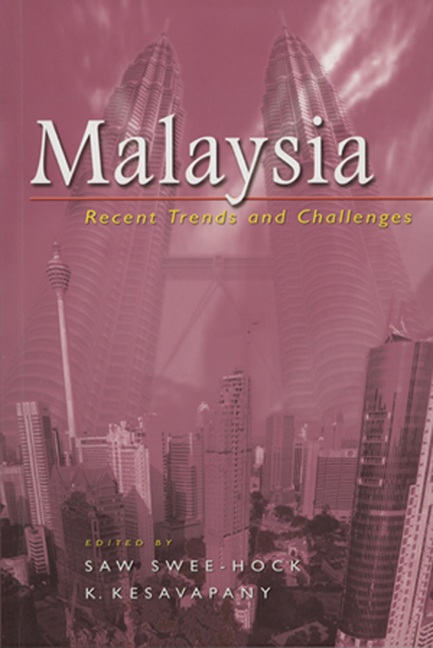Book contents
- Frontmatter
- Content
- Preface
- Foreword
- Contributors
- 1 Population Trends and Patterns in Multiracial Malaysia
- 2 The Emerging Politics of Islam Hadhari
- 3 Bangsa Malaysia: Vision or Spin?
- 4 The 2004 Malaysian General Elections: Economic Development, Electoral Trends, and the Decline of the Opposition
- 5 The UMNO-PAS Struggle: Analysis of PAS's Defeat in 2004
- 6 The Malay Electorate in 2004: Reversing the 1999 Result?
- 7 UMNO and BN in the 2004 Election: The Political Culture of Complex Identities
- 8 Malaysia's Civil Service Reform: Mahathir's Legacies and Abdullah's Challenges
- 9 Reinventing Governance in Corporate Malaysia: The Challenges Ahead
- 10 Globalisation and Ethnic Integration in Malaysian Education
- 11 Globalisation and the Challenges Facing Malaysia's Economy
- 12 Promising Start to Malaysia-Singapore Relations
- Bibliography
- Index
7 - UMNO and BN in the 2004 Election: The Political Culture of Complex Identities
Published online by Cambridge University Press: 21 October 2015
- Frontmatter
- Content
- Preface
- Foreword
- Contributors
- 1 Population Trends and Patterns in Multiracial Malaysia
- 2 The Emerging Politics of Islam Hadhari
- 3 Bangsa Malaysia: Vision or Spin?
- 4 The 2004 Malaysian General Elections: Economic Development, Electoral Trends, and the Decline of the Opposition
- 5 The UMNO-PAS Struggle: Analysis of PAS's Defeat in 2004
- 6 The Malay Electorate in 2004: Reversing the 1999 Result?
- 7 UMNO and BN in the 2004 Election: The Political Culture of Complex Identities
- 8 Malaysia's Civil Service Reform: Mahathir's Legacies and Abdullah's Challenges
- 9 Reinventing Governance in Corporate Malaysia: The Challenges Ahead
- 10 Globalisation and Ethnic Integration in Malaysian Education
- 11 Globalisation and the Challenges Facing Malaysia's Economy
- 12 Promising Start to Malaysia-Singapore Relations
- Bibliography
- Index
Summary
Introduction
This chapter focuses on the pattern of the relationship between United Malays’ National Organisation (UMNO) and its partners in the Barisan Nasional (National Front, or BN) and the factors regulating their relationship especially in the context of the 2004 general election. The pattern of the relationship and the fundamental factors affecting them provide insights into the dynamics of power relations between the political parties. These patterns and factors affect the general perception of actors within the complex grouping, and the manner by which each component group and its internal constitution would perceive its own role and identity, and, in turn, how they would react towards each other and towards the outside world. With each component upholding its fundamental objective of existence, which is perpetuating the group identity, their interactions will inevitably generate tension, rivalry, and a certain degree of conflict. In the long run, a political culture sustaining the group cohesion will emerge. To maintain and perpetuate the complex grouping, each component would always have to make adjustments between the idealism of its subjective demands and the reality of group cohesion. The interplay of such adjustments is reflected in the complex web of inter-group and interpersonal identity maintenance and cohesive relationships among members. In the long run, the relationships would allow the sedimentation of the pattern within which the identities are maintained and interactions carried out. The case of the Malaysian elections, specifically the recent 2004 general election, provides us with an insight into the perpetuation of the culture of complex identities.
The March 2004 Malaysian general election is a historic event viewed in the light of the leadership of the new Malaysian prime minister, Abdullah Ahmad Badawi. Not only is the prime minister new to his post, but to call an early election and emerge victorious can be considered a personal triumph.
- Type
- Chapter
- Information
- MalaysiaRecent Trends and Challenges, pp. 157 - 194Publisher: ISEAS–Yusof Ishak InstitutePrint publication year: 2005

